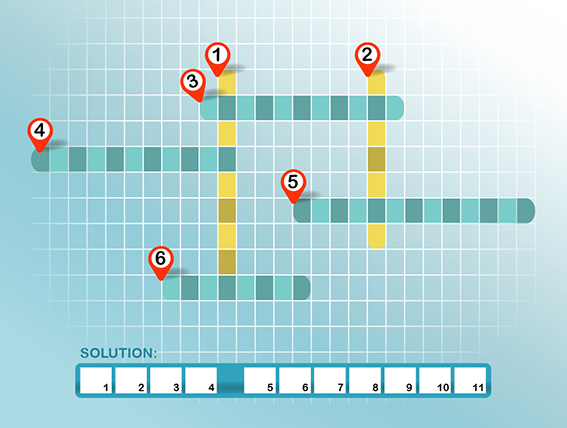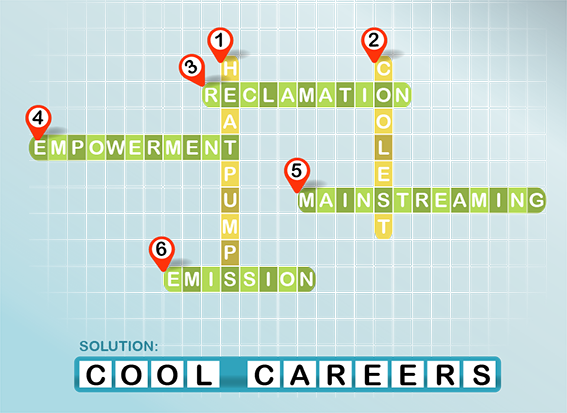WELCOME TO THE UNIDO MONTREAL PROTOCOL NEWSLETTER
Safely stored and transported food, vaccines, comfortable living and working environments: these are only some of the ways refrigeration, air-conditioning and heat-pumps impact our daily lives. World Refrigeration Day marks the important contribution the refrigeration, air-conditioning and heat-pump sector makes to our modern way of life, which is why it goes without saying that the fifth edition of our quarterly newsletter touches upon the theme of “World Refrigeration Day: “Cooling Champions: Cool Careers for a Better World”
The fifth edition of our quarterly newsletter includes a number of cooling champions we have the pleasure of featuring. Ms Bojana Radeski, National Ozone Officer, Republic of Serbia and Mr Vasil Eftimov, UNIDO International Consultant, tell us about the cool steps Serbia has undertaken in achieving sustainable refrigeration, as well as the role legislation plays in helping Serbia comply with the Montreal Protocol. Next, the King of Cool – or more precisely- President of the Union of Association of African Actors in Refrigeration and Air-Conditioning, Mr. Madi Sakande, delves into the important steps African nations need to take for the future of refrigeration and to achieve the 2030 Sustainable Development Goals.
Lastly, many readers are familiar with a true cooling champion from UNIDO’s Montreal Protocol division who has supported countless countries in achieving their objectives under the Montreal Protocol, this is none other than Milan Demko. Our cooling champion, Milan, has decided that after a career spanning 24 winters, it would be an ice day to retire. To quote Milan, his “good assistant” Nil Oezhan, tells us about her experiences working with him in a special interview to commemorate his time with UNIDO, which also features a short interview with Milan himself.
As always, be sure to try your hand at our quiz, which of course has a World Refrigeration Day focus! Similarly, check out our event announcements, including our recently launched SDG publication: Montreal Protocol and Beyond, as well as a link to our cooling champions social media campaign.
Keep cool and happy reading!
Your UNIDO Montreal Protocol Division
ASK UNIDO
Milan Demko, Industrial Development Officer in the Montreal Protocol Division, is retiring after 24 years of working at UNIDO. Nil Oezhan, Project Assistant, reflects upon her experiences and lessons learned from working closely together with him, showcasing how a possible cooling career in the public and international sphere could look like.
INTERVIEW
National Ozone Officer of the Republic of Serbia and international consultant for UNIDO, on Serbia’s path to achieving sustainable refrigeration.
FEATURE ARTICLE
International Expert and President of the Union on Association of African Actors in Refrigeration and Air-Conditioning on the future of refrigeration and the steps needed by African nations to achieve the Sustainable Development Goals
CROSSWORD
VERTICAL
I. WRD 21 will focus on careers in the refrigeration, air-conditioning and … industry.
II. 26th of June is the … day of the year.
HORIZONTAL
Tip: MPD newsletter Issue 4
III. RRR stands for recovery, recycling and …
IV. Women’s … is essential to expand economic growth and social development.
V. The goal of UNIDO’s gender training is to promote gender … and to achieve gender equality in Montreal Protocol projects.
VI. 1 home AC running on R410A has a direct CO2… of 6 tons during lifetime (equals 60,000km by car).
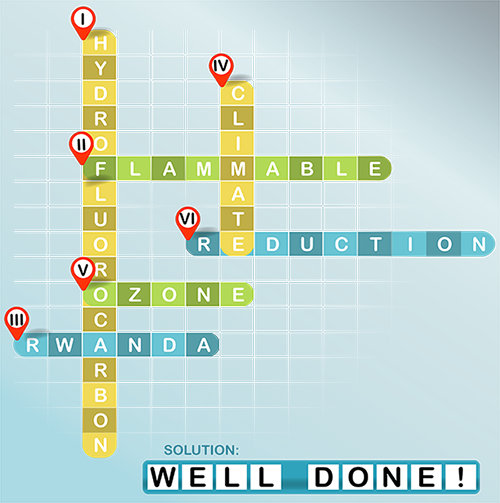
NOTICE BOARD
Notes
-
Spotlight
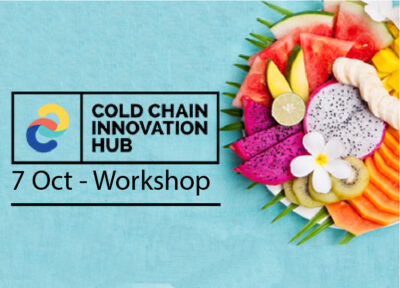
Upcoming: Philippines’ CCI-Hub is hosting a technical training workshop on “Advanced Technologies for Commercial Food Retail”.
Notes
-
Social Media
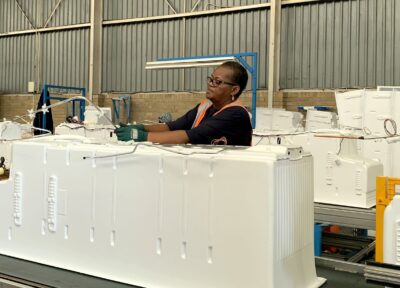
Learn about online events in the cooling sector and stay up-to-date with our projects around the world by following our brand-new LinkedIn channel
Notes
-
Events

In honor of World Refrigeration Day we hosted the Kigali in Action Webinar on the 26th of June for our trusted partners.
Correct! the answer is: B
Wrong, the answer is: B
- The Paris Agreement was opened for signature on 22 April 2016 (Earth Day) and went into effect on 4 November 2016.
- The aim of the Paris Agreement is to: hold the global average temperature well below 2 °C above the pre-industrial level and pursue efforts to limit the temperature increase to 1.5 °C above the pre-industrial levels.
- The Kigali Amendment was agreed upon in 2016 and entered into force in 2019. The Kigali Amendment builds on the historic legacy of the Montreal Protocol agreed in 1987.
- The agreement will see an 85% phase-down in developed countries by 2036, an 80% phase-down by 2045 in most developing countries including China, and the remaining developing countries reaching an 85% phase-down by 2047.
- The Paris Agreement was opened for signature on 22 April 2016 (Earth Day) and went into effect on 4 November 2016
- The aim of the Paris Agreement is to: hold the global average temperature well below 2 °C above the pre-industrial level and pursue efforts to limit the temperature increase to 1.5 °C above the pre-industrial levels.
- The Kigali Amendment was agreed upon in 2016 and entered into force in 2019. The Kigali Amendment builds on the historic legacy of the Montreal Protocol agreed in 1987.
- The agreement will see an 85% phase-down in developed countries by 2036, an 80% phase-down by 2045 in most developing countries including China, and the remaining developing countries reaching an 85% phase-down by 2047.
ASK UNIDO
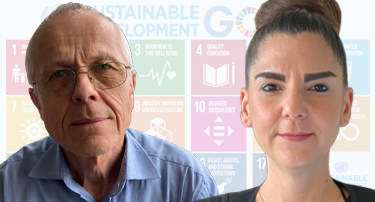
You Ask, We Answer!
Milan Demko, Industrial Development Officer in the Montreal Protocol Division, is retiring after 24 years of working at UNIDO. Nil Oezhan, Project Assistant, reflects upon her experiences and lessons learned from working closely together with him, showcasing how a possible cooling career in the public and international sphere could look like.
Ask UNIDO – How does a cooling career in UNIDO could look like?
This World Refrigeration Day issue notably also features a special “Ask UNIDO” section. One of our dear colleagues from the Montreal Protocol Division, Milan Demko, is retiring after 24 years of working at UNIDO. We wanted to use the opportunity to present two of our very own cooling champions and show how a possible cooling career in the public and international sphere could look like. In this more personal article, Nil Oezhan, UNIDO Project Assistant, reflects upon her experiences and lessons learned from working closely together with Milan including a particularly memorable mission together to Syria. Make sure to read until the end as – in true Milan-fashion for all those who know him – he also shares with us some takeaways on working on Montreal Protocol projects.
What did you learn from Milan in his function as a Project Manager?
Nil: Milan is a Chemical Engineer who has worked as part of UNIDO for 24 years on the implementation of Montreal Protocol projects in 20 countries, such as the Republic of Congo, the Sudan, Pakistan, the Niger and Syria, to name but a few. Before joining UNIDO, he was working in the private sector in Slovakia and Libya. This brief overview tells a lot about his rich experience and the knowledge he was able to share with me and our counterparts. I was truly able to learn a lot from him in the time we worked together!
Since I started working with Milan, my understanding of the terms “team work” and “dedication” have changed to a whole new level. We have been working closely on all aspects of the project planning, implementation, monitoring and reporting, which has helped me to continuously learn and grow in my area of work. The project planning is a crucial phase for every project’s success, and Milan is particularly meticulous in the level of details and effort he puts into developing projects. Taking into consideration that our work is to transfer new and sustainable technologies to developing countries, a process that does not always goes smoothly, the detailed project planning always proved helpful in ensuring project success.
How did the work with Milan start for you and what were some of the projects he worked on?
Nil: Working in an international organization requires from people to have excellent communication skills and openness for different cultures. It is also a very enriching experience. Both Milan and I, managed to quickly establish a team spirit and work based on trust and mutual respect. This was a promising start for both of us when we starting working in our small team. He has been working in 20 countries on the implementation of Montreal Protocol projects related to the phase out of hydrochlorofluorocarbons (HCFCs), and the earlier projects related to the phase out of chlorofluorocarbons (CFCs) and methyl bromide (MBr), all of which are not only ozone depleting substances, but also chemicals with high global warming potential. Milan’s expertise is in the foam sector, that means everything related to the production of polyurethane foam, flexible slab stock foam, rigid foam, polyurethane integral skin, flexible moulded polyurethane foam, extruded polystyrene – which are used for manufacturing of insulation panels, sandwich panels, insulated fishing boxes, domestic and commercial refrigerators, unitary air-conditioning equipment, cold rooms, cold storages, etc. In light of the World Refrigeration Campaign and UNIDO’s Montreal Protocol Division’s campaign for nominating your cooling champion, I would definitely nominate Milan for his contribution to the Montreal Protocol implementation which translates into more than 3,000 ODP tonnes phased out.
Can you share a specific project work example to better imagine how both your workdays look like?
Nil: One of the dearest to my heart is the project we are working on for the phase-out of HCFC-22 and HCFC-141b from the manufacture of unitary air-conditioning equipment and rigid polyurethane insulation panels at the company Al Hafez Group, based in Syria. Having a career in international development implies a lot of challenging situations, working under pressure, but also very rewarding experiences. This one is particularly dear to me because, despite of the usually bad news that the media covers in Syria, we are working on a project that will demonstrate the contrary. The project involves close cooperation with the National Ozone Officer (NOO) ensuring that the country identifies HCFC consumers and eligible manufacturers that can convert to non-ODS substances. The company Al Hafez Groups is producing unitary air-conditioning equipment and rigid polyurethane insulation panels. Despite the challenging situation, the company has resumed with production. However, given that the technology used has a negative impact on the ozone layer and the climate, a project was prepared by UNIDO and approved by the Multilateral Fund for changing the company technology to non-ODS chemicals.
As soon as the situation in the field allowed, we organized a mission to visit the company premises and meet the company representatives and the NOO.
Jointly with the National Ozone Officer (NOO), we verified the baseline conditions in the company in terms of operation and functioning and checked the available production premises where new equipment and machinery for the main project components (Refrigeration and Foam) were planned to be installed. This mission took place in 2019.
The factory of Al Hafez Group consists of seven plants and nine manufacturing halls and workshops and four large storage facilities: Foaming, cold-rooms, showcases, vitrines, water chillers and other commercial refrigeration body building, series of workshops manufacturing components and assembling heat exchangers as well as a computer design centre and testing station. We also visited the company’s premises located in the city of Homs, where the character of technology is very similar to Damascus’ factory, although on a much smaller scale. The company even plans to further expand and build new manufacturing facilities 40km north-east of Aleppo.
During our mission, jointly with the NOO we agreed on the modalities of performance control and performance verification according to the Memorandum of Agreement. It was agreed that the factory was prepared for the respective re-organization to install new technological components to be purchased in the course of this project implementation.
In terms of project planning and implementation, this project is not very different from other Montreal Protocol projects where we do conversion of enterprises to new technologies. What makes this special, is the persistence and optimism of all people involved. This project is more than simple procurement and installation of equipment that will help the company produce air-conditioning equipment and insulation panels with ODS free technology. It is also a demonstration of the commitment from our Syrian counterparts and beneficiaries to rebuild the industry in an environmentally friendly and sustainable way, as well as commitment from the international community to support this process, transfer new technologies and increase manufacturing capacities that will hopefully translate into new job openings for the Syrian women and men.
But coming back to the main character of this article, it was also Milan’s persistence that kept this project alive, even when odds were against us. This has taught me, as his assistant, many valuable lessons which I am thankful for.
Milan, all those who know you will undoubtedly miss your positive attitude around UNIDO headquarters as well as your ability to always answer the question: “How are you?” with: “I am the best in the universe!” Your assistant, Nil, has shared with us her experiences of working with you and the excellent support you have provided not only to the dozens of countries you have worked with but also to colleagues who have had the pleasure of working with you. Now, we’d like to hear from you:
What does the Montreal Protocol mean to you and how has it contributed to sustainable development at the global level?
Milan: The Montreal Protocol as such is naturally one of the most important global environmental agreements. Huge, environmental impact, due to two vastly improving effects of a) ODP reduction and b) GWP reduction, in combination with technological feasibility to implement, proved it most probably the most successful multilateral agreement in history. For me, it has meant the opportunity to contribute to good and meaningful work and even more. Nonetheless, the work continues through further stages, hence, I am hopeful and believe in future positive developments now that the Kigali Amendment to the Montreal Protocol is a reality and that the work continues not only to phase out ozone depleting substances, but to prevent and decrease the use of substances, such as the hydrofluorocarbons (HFCs), that have high global warming potential.
How do you see the future of Montreal Protocol?
Milan: The future of the Montreal Protocol should be limited. Otherwise, the sustainability is missed. And to add something more philosophical at the end: Or it should stay till the end of the mankind, since the desire to improve is an intrinsic character of a human. However, would a will and possibility to fund such developmental pertain?
What are your top three recommendations for countries for achieving the Montreal Protocol targets?
Milan: To be short and to the point:
#1 DO; #2 YOUR; #3 BEST
Milan, from all of us at UNIDO’s Montreal Protocol Division, we wish you all the best for your retirement!
INTERVIEW
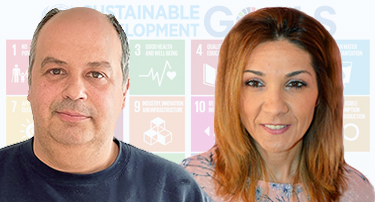
Interview with Ms Bojana Radeski and Mr Vasil Eftimov
Bojana Radeski, National Ozone Officer of the Republic of Serbia and Vasil Eftimov, international consultant for UNIDO, on Serbia’s path to achieving sustainable refrigeration
When did sustainable refrigeration become relevant in Serbia and which is the path the country is following?
Since 1990, refrigeration and air-conditioning are sectors in which there are constant activities and improvements in the Republic of Serbia. From 1999 until 2010, activities were focused on the elimination of CFC (Chlorofluorocarbon) substances. Currently, the Republic of Serbia is in the elimination phase of HCFCs (Hydrochlorofluorocarbons) and in the final stages of preparing for ratification of the Kigali Amendment.
Which are the main activities you are carrying out in Serbia and what have been the main achievements in the last few years?
In the last few years, the main focus was on improving the existing legislation and the establishment of the National Certification Scheme.
The regulation on the certification of personnel performing certain activities related to control substances and certain fluorinated greenhouse gases was adopted in 2016. This regulation is fully in compliance with European Commission Regulation (EC) No. 303/2008 (repealed by Implementing Regulation (EU) 2015/2065).
The National Ozone Unit (NOU) of the Republic of Serbia, in cooperation with UNIDO, prepared new training materials following the requirements set out in the regulation. All necessary tools and materials for conducting trainings and exams have been provided in four established training centres in the Republic of Serbia. A ban on the import of equipment containing or relying on HCFC substances was introduced in 2018.
The training of environmental inspectors and customs officers was a part of the project activities in the last few years.
A checklist for controlling RAC (Refrigeration and Air-conditioning) equipment containing or relying on ozone-depleting substances (ODS) and F-gases for environmental inspectors has been prepared and trainings have been organized for the inspection of this type of equipment.
A new manual and a poster with tariff codes were prepared and a training was organized for the control of import/export of ODS and F-gases for customs officers.
How many people benefit from these activities and which opportunities do they have available to them?
It is estimated that there are around 2,500 – 3,000 RAC service technicians in the Republic of Serbia. They are directly involved in activities such as the installation, maintenance and decommissioning of equipment containing refrigerants. The establishment of a national certification system ensures that these RAC technicians have the necessary skills and knowledge to perform certain working activities according to the category of the certificate that they possess.
Furthermore, end users also receive indirect support, since their system and equipment will be installed and maintained by skilled technicians.
In honour of World Refrigeration Day, we would like to know how you, in your role at the National Ozone Unit, have seen this sector grow and transform in Serbia?
Stakeholders involved in this sector are fully aware of ozone layer depletion and climate change. They are aware of all the Montreal Protocol control measures and are continuously trying to find new solutions and possibilities during the design, installation and maintenance of systems and equipment containing substances controlled by the Montreal Protocol.
Throughout project activities, NOU Serbia has supported four manufacturing companies in the elimination of the production of equipment working on ODS.
We have examples of manufacturers of equipment already transferring their production from high-GWP (Global Warming Potential) refrigerants to natural and flammable hydrocarbon (HC) refrigerants, with negligible GWP. Although this is still in the first stage, we can already see steps towards the use of natural and flammable refrigerants in some applications. There are examples of supermarket applications using HCs. In other words, this industry is at the forefront of environmental protection.
This year’s World Refrigeration Day theme is “Cooling Champions: Cool Careers for a Better World”. Who are some of the cooling champions you work with in Serbia?
The Ministry of Environmental Protection of the Republic of Serbia and the NOU, as a part of the Ministry, are constantly working on updating the legislation in the refrigeration industry in order to provide Serbia’s contribution to the world efforts in achieving the goals of the Montreal Protocol.
We must emphasize the work of the four established training centres in Republic of Serbia, which are the following: (1) Technical School in New Belgrade, (2) High Mechanical School in Novi Sad, (3) Secondary Vocational School in Kragujevac and (4) Secondary Vocational School in Nis. These four training centres with their 20 trainers, five trainers in each training centre, supported by the NOU of Serbia and UNIDO as an implementing agency, managed to organize 30 training sessions in which 501 RAC service technicians were trained for the highest category of stationary equipment (category A-I). These trainings had such a huge impact in the country that they led to the constitution of a new association, namely the “Union of Air-conditioning Service Providers” , which was formed only three months after the initiation of the trainings.
These training centres organized 23 assessment sessions for the trained service technicians (14 assessment sessions were organized from March 2020 to January 2021, following all national COVID-19 prevention recommendations). A total of 433 RAC service technicians successfully passed the exams and will gain a certificate for Category A-I. Based on these results, the Ministry of Environmental Protection issued 95 certificates to RAC service technicians and 30 certificates to RAC service companies.
As already mentioned, the NOU of Serbia, in cooperation with UNIDO, prepared all the necessary training and assessment materials. The training manual is available for download on the web page of the Ministry of Environmental Protection, and on the web page of the training centres. This training manual, including the complete list of questions for the theoretical part of the assessments, is available for download on the web pages of the training centres.
What would be your advice to someone who wants to start a career in refrigeration?
We definitely encourage all those who want to start a career in this field to do so. The RAC sector is huge and it provides opportunities for many people. Working in the RAC sector is challenging but also brings new experiences.
What would be your advice?
Go for it. Become a cooling champion. This is a cool career for better a world.
What are the next steps and what is your vision for the future?
We plan to continue to support the training centres with the organization of trainings for all certificate categories from A-I to A-IV for stationary equipment and category B for mobile air-conditioning (MAC) equipment. We are constantly working on the improvement of the training materials, since we strongly believe that qualified personnel is important for achieving our goals, the elimination of ODS and the reduction of the use of high-GWP refrigerants. We are currently in the process of finalising training material on the topic of flammable and natural refrigerants (such as hydrocarbons, ammonia, CO2) and plan to include this material into current trainings as introductory material which will later lead to the establishment of a training curricula for flammable and natural refrigerants.
We are actively working on the establishment of a system for the inventory of equipment containing refrigerants. Knowing the amount of each type of refrigerants, the application in which this equipment is used, as well as the power consumption of this equipment in different sectors and applications is of upmost importance for us to better plan our future activities.
We plan to continue to provide support to state and local environmental inspectors, as well as to continue to support customs officers. We also plan to continue our cooperation with RAC service companies, RAC service technicians and RAC Associations. Additionally, the establishment of a recovery and recycling system is another major focus of our activities.
Our ultimate vision and goal is the wider use of low-GWP refrigerants. We want to do our part in the global efforts for achieving this goal.
FEATURE ARTICLE

Refrigeration and the Sustainable Development Goals
On the occasion of World Refrigeration Day 2021, Madi Sakande, International Expert and President of the Union of Association of African Actors In Refrigeration and Air-Conditioning (U-3ARC), shares with us his insights on the future of refrigeration, the steps needed to achieve the Sustainable Development Goals (SDGs) and concrete action points for African nations
Refrigeration and the Sustainable Development Goals
On the occasion of World Refrigeration Day 2021, Madi Sakande, International Expert and President of the Union of Association of African Actors In Refrigeration and Air-Conditioning (U-3ARC), shares with us his insights on the future of refrigeration, the steps needed to achieve the Sustainable Development Goals (SDGs) and concrete action points for African nations.
Why we all should celebrate cooling and World Refrigeration Day (WRD 21)
In my humble opinion, this day should be decreed by the United Nations General Assembly and celebrated by the whole world and not just the players in the refrigeration sector as is the case today, three years following its founding by my dear friend and colleague, Stephen Gill.
The aim of World Refrigeration Day is to raise awareness among the public about the importance of refrigeration technologies in everyday life. To mark the occasion, the birth date of the creator of international unity in physics, Lord Kelvin (Sir William Thomson), born on June 26 1824, was chosen. You may recognize that ‘kelvin’ is the measuring unit for temperatures, as named in his honor.
Refrigeration is increasingly assuming a central role in the world economy and is the only possible response to the fight against malnutrition, hunger, and certain diseases in developing nations. In this regard, the refrigeration sector becomes even more important in achieving the goals of the UNGC – SDGs for which it has an impact, whether direct or/and indirect.
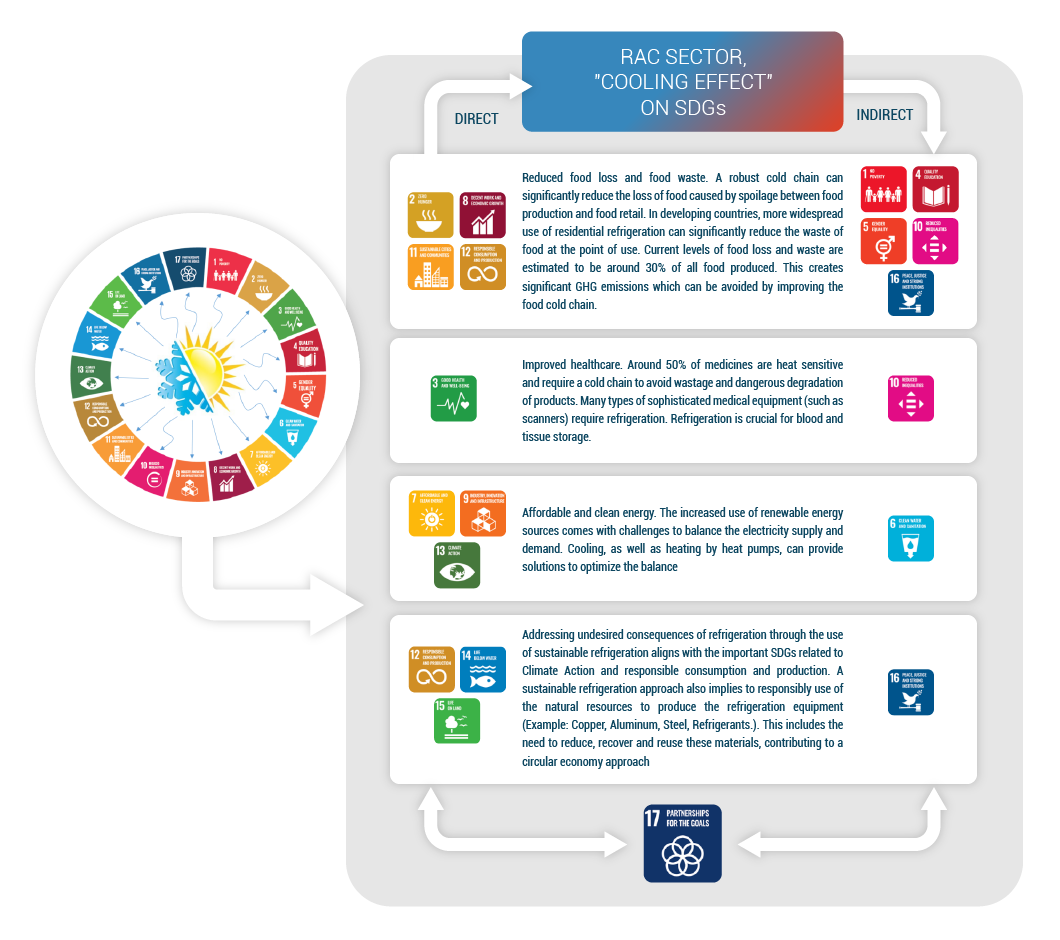
Cooling (Refrigeration & Air-conditioning) is for the Sustainable Development Goals, what the lubricant is for a mechanical transmission chain. Cooling is the key to sustainable development.
The role of partnerships and champions in refrigeration
The WRD 21 campaign will focus on careers in the refrigeration, air-conditioning and heat pumps industry and is titled “Cooling Champions: Cool Careers for a Better World”. The goal of the campaign is to inspire students and young professionals – for both men and women – in all countries, encouraging them to meet the challenges faced in their communities. Refrigeration is at the very heart of modern life.
More than 15 million people are employed worldwide in the refrigeration sector. The total number of refrigeration, air-conditioning and heat-pump systems in operation worldwide is around 5 billion. Those systems provide the conditions we require for health, comfort, worker productivity, manufacturing, and essential environments for food, pharmaceuticals, and digital data. Dedicated professionals design, build, maintain, and regulate them, as well as educate a new generation of practitioners. Opportunities within the industry abound for young people with a wide range of career aspirations. Advanced cooling technologies need to be implemented in order to expand life required environmental conditions while meeting sustainability requirements of international climate and ozone protection accords.
A new generation of cooling champions – engineers, technicians, researchers, educators, policy experts and executives – are needed to create controlled environments modern life requires. The benefits of reaching into a wide diversity of communities for promising talent will be a high campaign priority. [1]
Governments and development agencies must collaborate closely with the associations of refrigeration players to understand where to change and invest in order to obtain optimal results.
This is particularly needed in developing countries where refrigeration equipment is erroneously classified as luxury goods and therefore does not bring any changes to the rules established several years ago which are not responding to the real needs of development.
For example, in sub-Saharan Africa, the import of refrigeration equipment is taxed between 40% and 65% -depending on the country – only because the refrigeration sector is classified as luxury and not as a sector of primary necessity, as it should be. This is problematic since development cannot be achieved without the work of 80% of the population living in rural areas that contribute to the economy predominately in the following areas: agriculture, breeding, and fishing (where water is available).
None of these activities can thrive without the cold chain.
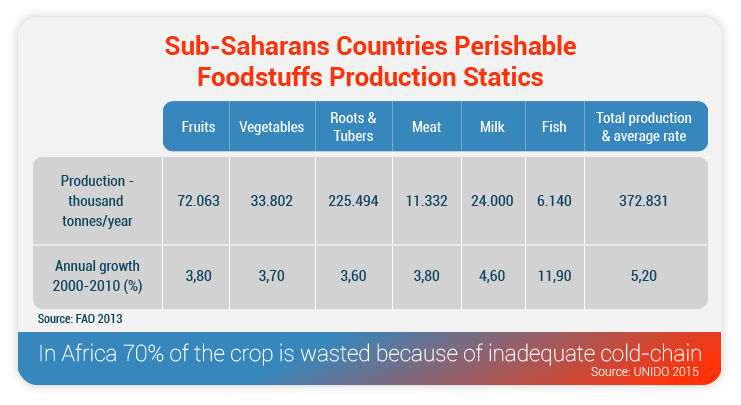
In this perspective, neither training centers, nor schools, even fewer universities train RAC technicians. So, most of the RAC technicians in developing countries are self-made individuals.
“Cooling, the key to sustainable development” in Africa with U-3ARC
U-3ARC (Union of Associations of African Actors in Refrigeration and Air-conditioning) has been created during the General Assembly held in Ouagadougou, Burkina Faso on September 24, 2020 by 30 associations of refrigeration and air-conditioning actors from 29 countries (Morocco, Tunisia, Cape Verde, Senegal, Mali, Guinea, Cote d’Ivoire, Burkina Faso, Togo, Benin, Niger, Chad, Nigeria, Djibouti, Congo, DR Congo, Uganda, Kenya, Rwanda, Burundi, Zambia, Zimbabwe , Lesotho, Madagascar, Cameroon, Gabon, Gambia, Comoros and Tanzania).
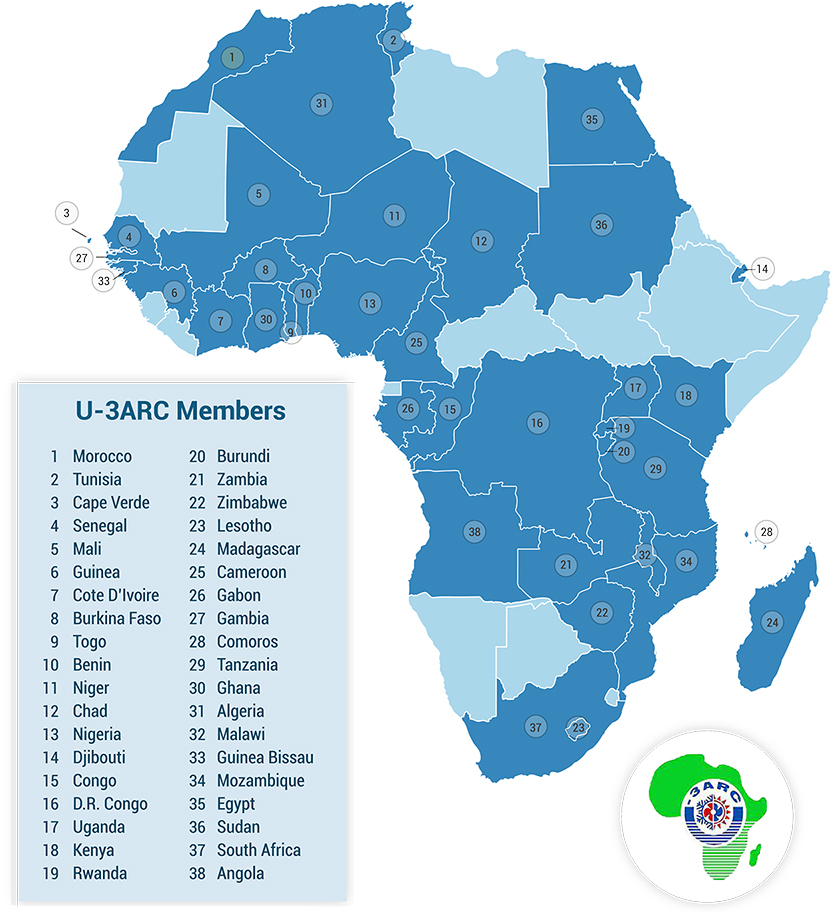
In order to contribute to the sustainable socio-economic development of Africa on the one hand, and on the other hand to overcome the environmental challenges linked to the refrigeration and air-conditioning sector, I took the initiative to bring together all the players in refrigeration and air-conditioning on the African continent by assembling all the presidents of national RAC associations (only where available, because many countries do not have an association). To date, there are 38 member countries and we are working hard to have all African countries in U-3ARC.
It is clear that the choice of our slogan: “Cooling, the key to sustainable development” is a message to those who do not know that there can be no sustainable development in Africa without the refrigeration sector.
The opportunities for and the importance of the African Nations in the future of refrigeration: A call for action to shape a new vision
The future of the world depends on the future of the refrigeration. Within this context, U-3ARC and UNIDO, but also others can, and should, join forces on the African level to achieve these goals involving all African public bodies, such as the African Union or the Economic Community of West African States (ECOWAS) by applying the following suggested actions:
- Give pride of place to the HVAC-R sector by integrating its promotion in policy documents and development strategies (establishment of a favorable legal framework for the development of refrigeration, construction of refrigerated infrastructures at the zone of production and consumption, promotion of youth entrepreneurship, application of community guidelines on crafts, framework for the promotion of the cold chain etc.).
- Involve professional organizations and associations in the field of refrigeration and air-conditioning in the development and implementation of policies and strategies and in activities related to refrigeration and air-conditioning.
- Accompany and develop vocational training centers while ensuring their proper functioning, their equipment in appropriate teaching materials and facilitating accessibility (e.g. offer of scholarships).
- Engage in reflection on zero-rating and/or exemption of refrigeration equipment and equipment, which is not a luxury but a necessity for ensuring the socio-economic development of the country.
- Initiate the creation of an authority in charge of refrigeration which is attached to the Prime Minister’s office to take charge of the promotion of refrigeration with regard to its importance in sustainable development, its stake for food self-sufficiency and its transversal character (for example: energy, agriculture-breeding-fishery sector, environment, health, industry, trade,…).
- Establish a legal framework for better consideration of refrigeration in public development policies.
- Include the cold chain in priority sectors through the promotion of public-private partnerships in this area.
- Instruct the implementation of exemption measures on cooling and air-conditioning equipment to promote their accessibility to the public and to producers in the agriculture, breeding and fishery fields.
- Strengthen the dynamics of installing cold rooms in the different regions for the conservation of agricultural, breeding and fishery products.
- Promote women in the refrigeration and air-conditioning professions.
- Adopt regulatory texts to consider energy efficiency in connection with refrigeration and air-conditioning during the design, construction and operation phases of buildings and structures.
- Adopt regulatory texts to control the import of certain types of refrigeration and air-conditioning equipment using regulated refrigerants.
- Develop a public administration benchmark for projects to acquire refrigeration equipment and for maintenance operations of said equipment.
- Support activities promoted by associations in the refrigeration sector.
[1] https://worldrefrigerationday.org/news/world-refrigeration-day-announces-theme-of-2021-campaign/
CONTACT US
Subscribe to our newsletter
Sign up to receive a quarterly email with updates and new content!
Disclaimer
The information presented in this newsletter does not necessarily reflect the views of UNIDO. Links to external websites are included solely to provide additional information and do not imply any official endorsement of the opinions, ideas, data, or products presented.
© 2020 UNIDO Montreal Protocol

